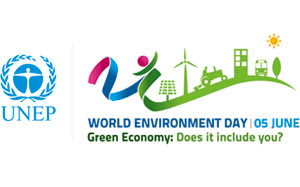'Green Economy: Does it include you?'
Nairobi, 22
February 2012 – The United Nations Environment Programme (UNEP) today announced
that Brazil, with one of the fastest growing economies in the world, will host
World Environment Day 2012 (WED) on 5 June.
This year's theme 'Green Economy: Does it include you?'
invites everyone to both assess where the Green Economy fits in their daily
lives and evaluate whether development through these pathways towards a Green
Economy can deliver the kinds of social, economic and environmental outcomes
needed in a world of seven billion people, climbing to over nine billion in
2050.
Brazil had previously hosted WED in 1992, on the eve of the
first Earth Summit, when world leaders, government officials and international
organizations met to refocus, recalibrate and deliver a route map towards
sustainable development.
"In celebrating WED in Brazil in 2012, we are returning
to the roots of contemporary sustainable development in order to forge a new
path that reflects the realities but also the opportunities of a new
century," said Achim Steiner, UN Under-Secretary General and UNEP
Executive Director.
"Three weeks after WED, Brazil will host Rio+20 where
world leaders and nations will gather in order to design a future that takes
sustainable development from theory and patchy success to the locomotive of
transformational change—a pathway that can grow economies and generate decent
jobs without pushing the globe past planetary boundaries," he added.
With a country of 200 million people, Brazil is the fifth
most populous nation in the world and has the fifth largest land mass on the
planet with 8.5 million square kilometers
In recent years Brazil has taken enormous steps to tackle
issues such as deforestation in the Amazon through enforcement efforts and
monitoring initiatives by the Brazilian government.
Indeed by some estimates, Brazil recently realized one of
the biggest greenhouse gas emission reductions in the world as a result of its
achievements in reducing deforestation rates.
According to UNEP's Towards a Green Economy: Pathways to
Sustainable Development and Poverty Eradication, the country is also at the
forefront of building an economy that includes recycling and renewable energy
and the generation of green jobs.
Brazil's recycling industry generates returns of US$2
billion a year while cutting greenhouse gas emissions by 10 million tonnes.
Recycling in all its forms already employs 12 million people
in three countries alone: Brazil, China and the United States.
Brazil is also the world leader in sustainable ethanol
production for fueling vehicles and is expanding into other renewable areas
such as wind power and solar heating systems.
The recent construction of 500,000 new homes in Brazil with
solar heating systems generated 30,000 new jobs.
"We are very pleased to host this global celebration
for the environment. The World Environment Day will be a great opportunity in
Brazil to showcase the environmental aspects of sustainable development in the
warmup to the Rio+20 conference," said Brazil's Minister of Environment,
Izabella Teixeira, who this week is attending UNEP's Governing Council meeting
in Nairobi, Kenya.
"The history of Brazil, the complexion of its diverse
and dynamic economy with its natural and nature-based resources allied to its
industries and its current and future role in international relations, offer a
lens and a unique perspective through which a broad-based, transformational
outcome is possible at Rio+20," said Mr Steiner.
"Brazil's
strong commitment to social and equity issues nationally and regionally and its
responsibilities towards developing and least developed economies can also
guide and shape the debates," he added.
"The
contemporary direction of sustainable development was born in Brazil -- in many
ways its future health, maturity and ability to respond to the challenges and
opportunities of a markedly different world will be forged in Brazil in four
months' time," said Mr Steiner.
The WED celebrations in Brazil on 5 June are part of
thousands of events taking place around the globe. WED 2012 will emphasize how
individual actions can have an exponential impact, with a variety of activities
ranging from a marathon, to community clean-ups, car-free days, green blogging
competitions, exhibits, green petitions, nationwide green campaigns and much
more.
For more information visit:
Details on UNEP's 12th Special Session Governing Council can
be found at: www.unep.org/GC
Towards a Green Economy: Pathways to Sustainable Development and Poverty Eradication can be found on the UNEP website: www.unep.org/greeneconomy



















No comments:
Post a Comment